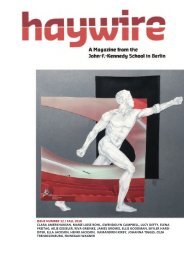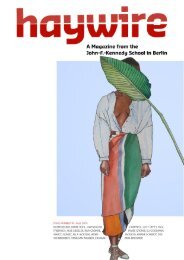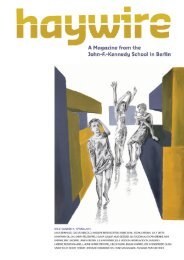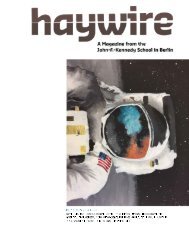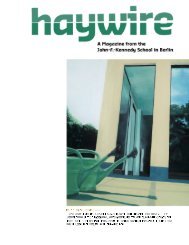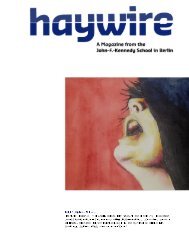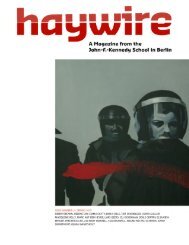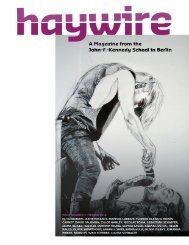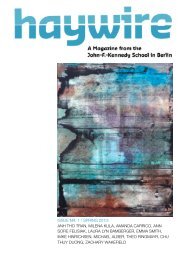Haywire Issue 4 Fall 2014
- No tags were found...
Create successful ePaper yourself
Turn your PDF publications into a flip-book with our unique Google optimized e-Paper software.
He pitied the East Germans when he witnessed them<br />
being cheated of the money they were unused to handling,<br />
buying West German cars at four times their<br />
value in their ignorant attempts to assimilate.<br />
Like many leftist activists, neither of them<br />
Back before 1989, Joan had developed<br />
a certain affinity for the<br />
Wall, and its sudden absence<br />
left her feeling geographically<br />
threatened.<br />
supported the reunification of Germany. They<br />
thought neither complete union nor separation by the<br />
Wall would succeed, but opted for the “new way”<br />
presented by politicians such as Helmut Kohl. Uli<br />
also mentions the concerns of other Western nations<br />
such as France and Great Britain, who worried that<br />
this would allow Germany to resume its place as a<br />
world power, whether economically or militarily, a<br />
fear that has verified itself. While Joan sympathizes<br />
with the financial deception of the East Germans<br />
at their arrival and disheartened at how easily they<br />
could be bought, she was at first shocked at their behavior.<br />
“The whole city stank, you couldn’t get a taxi,<br />
the subway was full…You felt really disrupted.” The<br />
Easterners’ right to move to West Germany may have<br />
been legitimate and recognized, but the Westerners<br />
felt, for the first time, protective of “their” Berlin and<br />
unwilling to welcome the new influx. “I felt like it<br />
was an invasion,” she continues. “Like, ‘get out!’”<br />
The reunified Germans celebrated but remained wary<br />
of each other with the same animosity with which<br />
they treated the minorities. Joan curbed her resentment<br />
with the realization that she, too, was a foreigner,<br />
and consoled herself with the thought that, like<br />
any family, they must soon have their first squabble.<br />
Both Joan and Uli agree that this hostility remained<br />
ingrained in the mindsets of both “Wessis”<br />
and “Ossis”. The West Germans were said to be unbearable<br />
know-it-alls, while the Easterners were notoriously<br />
lazy in the minds of the Westerners. Thanks<br />
to the fall of Communist Germany, the Wessis also<br />
felt superior, since their system had prevailed. The<br />
East Germans, for their part, suffered from a certain<br />
insecurity. East German products all but disappeared,<br />
in favor of imported goods from Western countries.<br />
Uli comments on how you could differentiate between<br />
West and East Germans by their phrasing even<br />
after the reunification, the language itself changed by<br />
the Wall. Joan, too, still feels the presence of a certain<br />
“wall in the mind”, as the author Anna Funder describes<br />
it, maintaining a clear boundary between the<br />
familiar and the unknown country that, to her, is East<br />
Berlin.<br />
A car drives by outside the window, as if to remind<br />
her of the freedom of movement she has gained.<br />
Back before 1989, Joan had developed a certain affinity<br />
for the Wall, and its sudden absence left her<br />
feeling geographically threatened. She feared for her<br />
work, too, and for the fate of everything the Greens<br />
(the political party in power at the time) had accomplished<br />
thus far in West Germany. Her gaze sinks<br />
to a paper in her lap, a hand drawn flyer depicting a<br />
Trabante car and a face unhappily inhaling its fumes,<br />
with the words, “Trabis, go home!” In her seventh<br />
month of pregnancy and witnessing her world crashing<br />
down around her, Joan turned to her own form of<br />
protest, placing these flyers on every Trabi in sight<br />
and dragging her family to a small demonstration.<br />
As she recognizes now, Joan disregarded the larger<br />
problem, the counterbalance to the overwhelming<br />
euphoria. The suicide and divorce rates skyrocketed,<br />
more people were involved in car accidents, intoxicated<br />
with speed, and racked up massive debt because<br />
of their inexperience handling Western money.<br />
They both trail off, and I am unsure of how to<br />
continue, until Joan claims she has a conclusion, a<br />
way of saving herself from the egotistical self-portrait<br />
she has painted. “My world was West Berlin and<br />
I was involved in a lot of political activity. We were<br />
creating a new society. And knowing people on the<br />
other side of the Wall were pulling on the same rope<br />
was reassuring. Then these Eastern tourists came in<br />
and destroyed my life, my world.” She recounts a trip<br />
to the Richardplatz market, her son Francis in hand,<br />
where she encountered a grandfather with his grandson.<br />
He pointed to a window in the building opposite<br />
and explained, “See, that’s where we used to live.”<br />
And Joan was reduced to tears at the beauty of their<br />
reunification. She grasped the true implications of the<br />
Wall falling. Far beyond the destruction of her sheltered<br />
bubble of a life, it meant the reunion of longlost<br />
family, friends, and lives.<br />
HAYWIRE <strong>Issue</strong> 4 <strong>Fall</strong> <strong>2014</strong><br />
29








